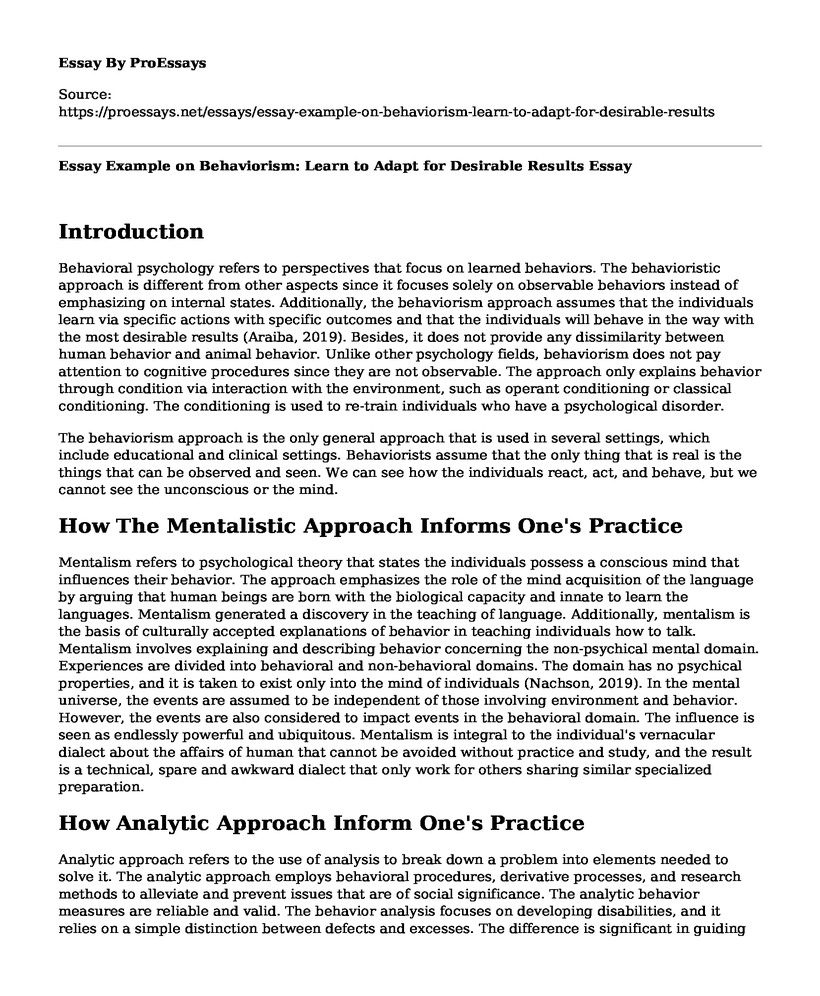Introduction
Behavioral psychology refers to perspectives that focus on learned behaviors. The behavioristic approach is different from other aspects since it focuses solely on observable behaviors instead of emphasizing on internal states. Additionally, the behaviorism approach assumes that the individuals learn via specific actions with specific outcomes and that the individuals will behave in the way with the most desirable results (Araiba, 2019). Besides, it does not provide any dissimilarity between human behavior and animal behavior. Unlike other psychology fields, behaviorism does not pay attention to cognitive procedures since they are not observable. The approach only explains behavior through condition via interaction with the environment, such as operant conditioning or classical conditioning. The conditioning is used to re-train individuals who have a psychological disorder.
The behaviorism approach is the only general approach that is used in several settings, which include educational and clinical settings. Behaviorists assume that the only thing that is real is the things that can be observed and seen. We can see how the individuals react, act, and behave, but we cannot see the unconscious or the mind.
How The Mentalistic Approach Informs One's Practice
Mentalism refers to psychological theory that states the individuals possess a conscious mind that influences their behavior. The approach emphasizes the role of the mind acquisition of the language by arguing that human beings are born with the biological capacity and innate to learn the languages. Mentalism generated a discovery in the teaching of language. Additionally, mentalism is the basis of culturally accepted explanations of behavior in teaching individuals how to talk. Mentalism involves explaining and describing behavior concerning the non-psychical mental domain. Experiences are divided into behavioral and non-behavioral domains. The domain has no psychical properties, and it is taken to exist only into the mind of individuals (Nachson, 2019). In the mental universe, the events are assumed to be independent of those involving environment and behavior. However, the events are also considered to impact events in the behavioral domain. The influence is seen as endlessly powerful and ubiquitous. Mentalism is integral to the individual's vernacular dialect about the affairs of human that cannot be avoided without practice and study, and the result is a technical, spare and awkward dialect that only work for others sharing similar specialized preparation.
How Analytic Approach Inform One's Practice
Analytic approach refers to the use of analysis to break down a problem into elements needed to solve it. The analytic approach employs behavioral procedures, derivative processes, and research methods to alleviate and prevent issues that are of social significance. The analytic behavior measures are reliable and valid. The behavior analysis focuses on developing disabilities, and it relies on a simple distinction between defects and excesses. The difference is significant in guiding behavior categorizations and directing the behavior change programs. The approach has important implications for improving the consequences of individuals with developmental and intellectual disabilities (van der Horst & Sleddens, 2017). The analytic method has been with behaviorally diagnosed situations such as emotional, behavioral disorders, and autism despite its broad utility as an instructional tool.
The behavioral analysis therapy focuses on techniques and principles of learning theory to improve social behavior. It helps to shape and refine previously learned skills, develop new skills, and reduce socially relevant problem behaviors. The analytic approach is validated to understand behavior and learning by looking at the occurrence of environment and behavior.
References
Araiba, S. (2019). Current Diversification of Behaviorism. Perspectives on Behavior Science, 1-19.
Nachson, I. (2019). Mentalistic Explanations of Organismic Behavior: Fact or Fiction?
Van der Horst, K., & Sleddens, E. F. (2017). Parenting styles, feeding styles, and food-related parenting practices about toddlers' eating styles: A cluster-analytic approach. PloS one, 12(5)
Cite this page
Essay Example on Behaviorism: Learn to Adapt for Desirable Results. (2023, May 23). Retrieved from https://proessays.net/essays/essay-example-on-behaviorism-learn-to-adapt-for-desirable-results
If you are the original author of this essay and no longer wish to have it published on the ProEssays website, please click below to request its removal:
- Unconditional Love Song
- Essay Sample on Bipolar Affective Disorder
- Personal Essay Example: Disturbing Facts About My Life
- Paper Example on Similarities and Differences between Novel Antidepressants and SSRIs
- Suicidal Crime Paper Example
- Target Behavior Modification Case Studies Paper Example
- Paper Sample on Fear and Anxiety Disorders: Understanding Social, Panic, PTSD, Separation, and OCD







